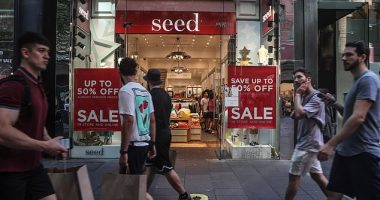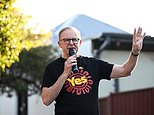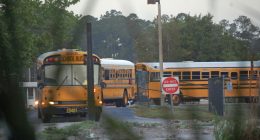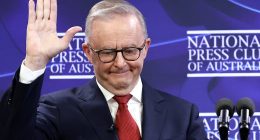
Australian diplomats are in the process of tying up or negotiating trade deals of varying levels involving all of those countries.
Chief among them is a free trade agreement with the European Union that both sides want completed by the middle of next year, something Albanese said he reinforced with the string of European leaders.
Negotiations are back on track after a freeze following French President Emmanuel Macron labelling then-prime minister Scott Morrison a liar regarding a $90 billion French submarine contract torn up as a result of the AUKUS agreement.
But major sticking points remain, principally how much access Australia’s powerhouse agriculture sector will get to the more protectionist EU.

European demands for product-labelling rules that could threaten Australian-made prosecco and other products are also a hot topic.
Albanese said he was “very hopeful” they could be resolved.
“I must say that [European Commission President Ursula von der Leyen] and [European Council President Charles Michel] were both very positive about the prospect of success,” he said.

“These things, though, need to be worked through and they also need to be ratified by each individual country, which is why I’ve sought out, and with all of the European leaders who were here, be they Pedro Sanchez of Spain, Olaf Scholz of Germany, the Italian Prime Minister, the French President.
“With all of them, I also reiterated the importance of the Free Trade Agreement between Australia and Europe.”

In a joint statement on Wednesday, von der Leyen and Michel said the leaders had agreed to prioritise getting a trade deal done that “generates new, commercially meaningful market access opportunities across all goods, services, investment and procurement”.
“We agreed to intensify negotiations on an ambitious trade agreement,” von der Leyen said, on Twitter.
“We will also work on a new partnership on raw materials.”
Read Related Also: Video shows CTA robbery suspects hit man with bottle on Red Line train near 95th St. Station

The EU leaders said there’d been improvements on tariff, services and investment offers in the last round of negotiations, held in October.
They also welcomed Australia’s strong support of Ukraine and condemnation of Russia, as well as improvements in its climate change action ambitions.
Newly signed trade agreements with India and the UK were also up for discussion when Albanese met with the countries’ leaders.
The prime minister said he spoke regularly with new UK PM Rishi Sunak as they sat alongside each other throughout the summit but also held a formal sit-down.

“We spoke about the Free Trade Agreement, which has been ticked off by the parliamentary committee today, and that we’re hoping to come into force in the first quarter of next year,” he said.
“We also spoke about AUKUS and the importance of those arrangements as well. And it was a very constructive meeting.”
Sunak has been under increasing pressure back home in recent days over his support of the trade deal with Australia, which was signed under former prime minister Boris Johnson, while Sunak’s successor, Liz Truss, was foreign secretary.

Sunak called the trade deal “one-sided” as he was campaigning to replace Johnson over the summit and former environment secretary George Eustice, who helped negotiate the deal, said his side gave away “too much” and it was “not actually a very good deal for the UK”.
But the UK prime minister has this week defended the deal, while pledging to prioritise national benefit over speed with future agreements.
Indian Prime Minister Narendri Modi highlighted trade, education and maritime cooperation after their meeting, while Albanese stressed a focus on Indo-Pacific security.
The Australia-India Economic Cooperation and Trade Agreement was signed in April, with final arrangements still to be made.









